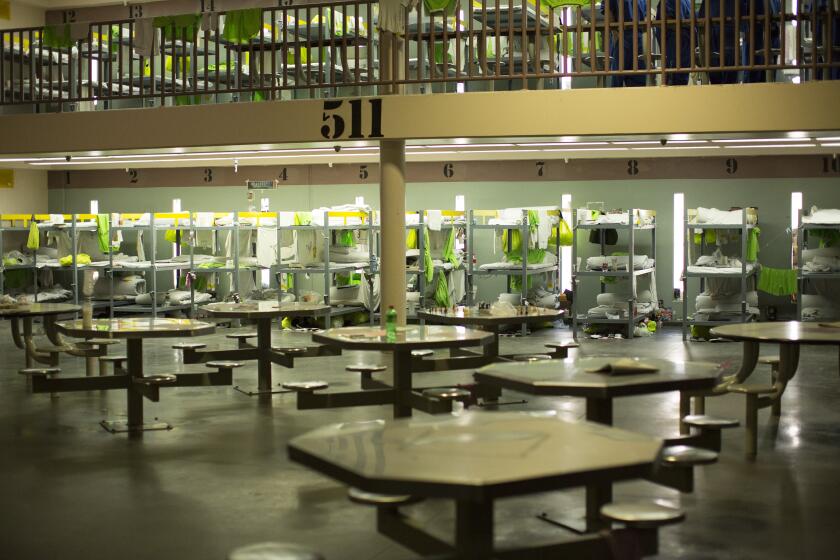Psychiatric care’s peril and profits

- Share via
Psychiatric Solutions Inc. was on its way to becoming the nation’s leading provider of private psychiatric care when it snapped up Sierra Vista Hospital in Sacramento in mid-2005.
The company put its well-honed business formula into action: Staffing fell. Beds filled up. Profits soared.
It was a winning strategy for investors. But for some patients, federal records show, checking into Sierra Vista proved dangerous -- at times deadly.
In December 2005, Ramona Knapp, 51, was left fatally brain damaged after hospital workers restrained her improperly, pinning her to the floor.
In March 2007, an unidentified 29-year-old woman was mistakenly given six times the prescribed dose of a potent antipsychotic drug. Even after 15 hours, she was too weak to swallow.
When Steven Burton, 55, checked in for treatment of alcohol abuse and depression in February, he complained of chest pains. The intake nurse didn’t notify a doctor because, as she later told regulators, “he didn’t look sick.”
Burton was discovered the next morning, facedown on the floor of his room, shaking and sweating. Staffers put him back in bed and paged a psychiatrist, getting no response. Two and a half hours later, a nurse found him blue and not breathing.
Burton, an El Dorado County agriculture official, came to Sierra Vista only at the insistence of his wife, Vickie.
“The last thing I was thinking,” she said, “was that I was taking him to the place where he was going to die.”
The lapses at Sierra Vista are among a string of cases involving abuse and neglect at PSI facilities nationwide, an investigation by ProPublica has found.
In a challenging field with a troubled history, PSI hospitals often fare worse than comparable private hospitals in meeting government standards for patient care, according to an analysis of state and federal inspection reports.
Since 2005, the 10 hospitals PSI has owned longest have compiled almost twice as many patient-care deficiencies as 10 similar hospitals owned by its closest competitor, Universal Health Services Inc.
The PSI hospitals were cited in three patient deaths and for placing patients in immediate jeopardy four times, the inspection records show. The UHS hospitals received no equivalent citations.
Among private psychiatric hospitals in California, Sierra Vista had the single highest rate of state and federal deficiencies -- about eight times the statewide average.
It has twice been fined $25,000 for endangering patients -- accounting for the only such penalties levied against psychiatric hospitals under a 2006 state law establishing the sanctions.
PSI executives declined to be interviewed for this article and, citing privacy law, would not discuss individual patients.
In written responses, they rejected the analysis showing the company’s hospitals compared poorly to others, saying: “Your assumptions, calculations and apparent conclusions are invalid.”
A spokesman, John Van Mol, said that PSI arguably has improved psychiatric care in the country overall. He cited the comparatively poor performance of state psychiatric facilities around the country in recent years.
PSI officials apologized for incidents resulting in harm to patients, saying they acted immediately to correct any problems. “Any incident involving patient care is one too many in our view, and everyone involved from the hospital level to the corporate level works very hard to prevent them,” they wrote.
Missing the mark
Recent state and federal inspections show the company’s efforts have fallen short:
* Poor patient supervision, understaffing and inadequate worker training have led to instances of chaos and brutality.
A 19-year-old alleged he was raped twice within 24 hours by a fellow patient at an Illinois hospital even after he reported the first assault, federal records show.
Staffers at a Texas facility had to barricade themselves in an office and call in a SWAT team to bring unruly residents under control.
In North Carolina, inspectors found, a 12-year-old boy with a history of sexual aggression was put in a room with a 5-year-old and attempted to force the younger boy to perform oral sex.
* Medical neglect and errors have resulted in grave harm. A nurse at another North Carolina facility gave a 7-year-old boy anti-seizure medication prescribed for an older patient, leaving him so drowsy that a doctor wrote in his chart that “he refuses to wake up.”
Workers in Virginia waited almost an hour to call an ambulance for a 17-year-old girl who had suffered a seizure and was bleeding profusely, inspection records show. The girl died later that day.
* In several instances, PSI employees have sought to hide their failings from regulators. A hospital in Texas was cited by state inspectors for concealing key facts about a patient abduction and a suicide. Regulators in Virginia uncovered what they called an organized scheme to cover up violence, suicide attempts and medication errors at a Charlottesville facility for juveniles.
* Some of the PSI hospitals most under fire from authorities are those the chain has owned longest. The Justice Department has opened an investigation into alleged patient-care problems at one of PSI’s first acquisitions, Riveredge Hospital near Chicago, issuing subpoenas for records earlier this year.
Nationwide since 2006, health officials have pulled children out of one PSI facility and have moved five times to revoke the state licenses of others. They have withheld or ordered the company to repay the federal government more than $2 million for providing substandard care.
In addition to thousands of pages of inspection reports by individual states and the U.S. Centers for Medicare and Medicaid Services, ProPublica’s investigation was based on hospital and court records and interviews with about two dozen former employees.
PSI executives say they are filling a desperate need in a tough business.
“Everyone at Psychiatric Solutions works hard every day to achieve excellence in patient care, often under extremely difficult circumstances to serve a patient population that includes extremely acute and complex diagnoses,” Chief Executive Joey Jacobs said in a written statement.
Chad Thompson, who worked in the admissions office at Sierra Vista when PSI took over, has a different view. He felt the chain put intense pressure on him to keep every bed full, with less emphasis on assuring that each patient got high-quality care.
“It’s a pattern of behavior driven totally by the almighty dollar,” said Thompson, now the director of a nonprofit that provides therapy to the uninsured and chairman of Sacramento County’s Mental Health Board, which advises the county Board of Supervisors.
“It’s not a client-centered approach. It’s a money-centered approach.”
Rapid growth
PSI got its start in 1997, when Jacobs took the helm after two decades as an executive at Nashville-based HCA, the nation’s largest hospital chain.
States had emptied many public psychiatric hospitals years before. Some for-profit psychiatric chains that emerged in the 1980s and 1990s were caught overbilling the government and collapsed.
PSI stepped into the gap. The company, headquartered in Franklin, Tenn., has grown from five facilities in early 2003 to 95 today, running about one in five free-standing psychiatric facilities in the United States. With more beds than any other chain, PSI treats about 8,800 patients on any given day.
About half of PSI’s beds are for adults and children in crisis who stay an average of 10 days in acute-care settings. They come from all walks of life, admitted either voluntarily or through commitments. The other beds are for youths -- many in the foster care system -- who stay in residential treatment for six months or more.
Roughly two-thirds of the care is paid for by taxpayers. PSI collected about $900 million through state and federal programs in 2007, the company’s SEC filing suggests.
PSI has thrived in a business in which many thought big profits were beyond reach.
The five PSI hospitals in California had a profit margin of more than 25% in 2007, according to data from the Office of Statewide Health Planning and Development. The average for the state’s other for-profit psychiatric hospitals was about 6%.
The data also shed some light on how PSI has achieved these results.
PSI’s California hospitals proportionally have fewer registered nurses than other private psychiatric facilities: about one for every four beds, compared with one for every two beds, according to the state data. Overall, the PSI hospitals have about one-third fewer staffers per bed.
PSI disputed the data, saying its facilities were staffed appropriately, meeting or exceeding state requirements, and that “we do not believe that we have fewer nurses per bed.”
But in the aftermath of the deaths of Knapp and Burton, regulators found fault with Sierra Vista’s staffing levels and worker training.
When Knapp began yelling and running the hospital’s halls one night in December 2005, a single technician was supervising the 14-patient unit, according to a federal inspection report.
Knapp, who worked at a social service center for the homeless mentally ill, had bipolar disorder and had tapered off her medication to prepare for gastric-bypass surgery.
The technician urged her to stop shouting.
“No, I don’t have to. You’re going to kill me,” Knapp shouted back, according to the report.
A worker in another unit rushed to Knapp’s room as she began to crawl and kick. The worker held down Knapp’s upper body, pinning her facedown on the floor, while the technician held her feet.
About five minutes passed as the worker lay on Knapp’s back, waiting for a doctor to order sedatives.
When staffers lifted Knapp onto her bed, they discovered that she had stopped breathing. Knapp died the next day.
Sacramento County’s chief pathologist ruled that the death was caused, in part, by restraint asphyxia, which results from being held in a position that obstructs breathing.
Inspectors later discovered the hospital’s staffing levels that night were not unusual. An audit of dozens of shifts showed that staffing was too low more than 80% of the time.
They also found no evidence that the staffers who restrained Knapp had been trained to handle combative patients safely.
The hospital submitted a lengthy plan for improvements after Knapp’s death. Yet Sierra Vista was cited again for understaffing and poor training after Burton’s death just over two years later.
After Burton collapsed in distress at 4:25 a.m., a nurse gave him anti-anxiety medication and posted a staffer outside his door. But workers failed to take further action when the doctor on call did not respond to pages, according to inspection records.
The Sacramento County coroner’s office ruled that Burton died as a result of built-up toxicity from his blood pressure medications, a finding that led a local newspaper to conclude the hospital had been “cleared” of responsibility in the death.
But the state upheld a $25,000 fine against Sierra Vista for failing to ensure Burton’s safety and provide him with timely care.
Regulators noted that some Sierra Vista staffers couldn’t find the facility’s defibrillator though it was just feet from where they stood.
“It doesn’t matter what he died from,” Vickie Burton said. “It matters that they didn’t get him help.”
When patients are injured or errors are made at psychiatric facilities, administrators are required to alert authorities.
“PSI has a standard of reporting all incidents fully as required by the states in which we operate and / or other regulatory authorities,” the company said in its written responses to questions from ProPublica.
Records show that the company has not always met that standard.
In Texas, workers documented making routine 15-minute checks on a suicidal patient, but surveillance video showed a 26-minute gap. In the meantime, the patient had asphyxiated himself, wrapping strips of a pillowcase around his neck.
At Whisper Ridge Behavioral Health, a PSI facility for juveniles in Charlottesville, Va., licensing officials received only a brief report in January 2006: A teen provoked a fight, his peers hit him and staffers brought him to the nursing station.
The facility did not mention that by the time staff intervened, the teen had been so brutally beaten that he briefly stopped breathing and suffered a seizure and concussion, according to Virginia’s mental health department. When police responded, Whisper Ridge employees initially tried to keep officers out of the facility, a police report said.
Nurses had sought to call an ambulance, but facility managers resisted at first, for fear “that the state might find out,” a state mental health department report said.
The department’s 2006 investigation found that the assault was just one of many incidents that Whisper Ridge managers had mishandled or not reported.
Workers took two teens who had overdosed to a hospital in their own cars or a facility vehicle instead of calling an ambulance, endangering the patients’ health, the regulators found.
“Staff was telling us they organized interviews about what to say to us, and gave residents treats so they wouldn’t talk about what was happening,” said Leslie Anderson, director of licensing for Virginia’s mental health department. “It was probably the worst case of that kind of deceit that we had seen.”
Overriding a doctor
In one instance, a doctor ordered workers to send a patient who had a 13-minute seizure to the emergency room, but the facility’s chief operating officer told the director of nursing to “sit on it and reevaluate later,” mental health department documents show.
Dr. James Jarrell, the doctor involved, said he did not realize his orders had been overridden until regulators uncovered it.
“That’s disturbing,” said Jarrell, who left the facility in 2007.
Authorities fined Whisper Ridge $30,000 as a condition of keeping its license. Medicaid ordered the facility to return more than $750,000 in payments for rendering inadequate care.
PSI is appealing that order.
In its responses to ProPublica, the company “categorically denied” there was systemic deceit at Whisper Ridge, adding that, since June 2006, the facility had been in compliance with state and federal requirements.
Steven Nickel woke up just after 2 a.m. lying on the floor of his shower. The water was running, flooding into his room at Cypress Creek, a PSI hospital in Houston.
He had tried to kill himself, cutting his left wrist with a razor, federal inspection records show. Workers were supposed to check on him every 15 minutes that night in May 2007, yet he had been slumped over the drain, unconscious, for about five hours.
Once awake, Nickel recalled in an interview, he left his room and showed the gaping wound to a nurse who yelled at him and accused him of forcing her to fill out more paperwork. Nickel said he felt stunned.
“If I would have died, how long would I have laid there before anyone would have known?” he said.
Cypress Creek’s former risk manager, Janet Geiger, submitted her resignation days after the suicide attempt.
“I felt it was basically an unsafe environment for patients and staff,” Geiger said in an interview, explaining that she reviewed at least five reports of injuries, medication errors or suicide attempts every day.
Looking into the case, federal regulators found that hospital managers had failed to address or to learn from a series of patient-care problems.
Officials moved to impose the harshest sanction at their disposal: termination from the Medicare program. Cypress Creek became only the sixth psychiatric hospital in the nation since 2000 to face the sanction.
“We said, ‘These people really are not getting it,’ ” Molly Crawshaw, a regional administrator with the Centers for Medicare and Medicaid Services, testified at a federal court hearing.
Cypress Creek was denied Medicare money for more than four months, costing the facility at least $1.5 million, based on an affidavit filed in the court proceeding.
A new attitude
The termination prompted PSI to make significant changes at the hospital.
The company brought in a turnaround specialist with a nursing background, Brian Brooker, as the new chief executive.
Brooker renovated the facility with patient safety and dignity in mind, installing special door hinges and shower heads to thwart patients bent on harming themselves. He added leather couches, art and plants. Signs went up throughout the facility saying, “Wow, it’s a new day.”
“You had to create a different attitude and environment,” Brooker said in a recent interview.
Cypress Creek reapplied successfully to the Medicare program.
In the first inspection after the hospital’s reinstatement, however, regulators cited it for inadequate staffing.
To some mental health advocates, PSI’s problems reflect the inherent pressures for-profit companies face in trying to deliver both quality care and robust profits.
Since the billing scandals of a decade ago,government and insurers have sharply limited the types of inpatient psychiatric treatment they cover. Now, the primary way to achieve big margins is by cutting costs, experts say.
“The incentive is to give less and less service, and [business leaders] are applauded for that in our upside-down world,” said New Jersey psychiatrist Gary Glass, an industry expert who has been hired to testify in a lawsuit against a PSI hospital.
On the contrary, PSI executives say, they want to provide more care to more patients.
The company is adding about 150 beds to its California hospitals, including Sierra Vista, a complex of brick buildings alongside a freeway about 10 miles south of the Capitol.
Last week, scaffolding surrounded the cinder-block walls that will house 48 beds set to be in use by 2009. A sign posted at the work site says: “Sierra Vista Hospital / Expanding Our Service to the Community / Changing Lives, Saving Lives.”
Christina Jewett and Robin Fields are writers for ProPublica.
christina.jewett
@propublica.org
ProPublica fellow Benjamin Protess and Times staff writer Jordan Rau contributed to this report.
More to Read
Sign up for Essential California
The most important California stories and recommendations in your inbox every morning.
You may occasionally receive promotional content from the Los Angeles Times.










